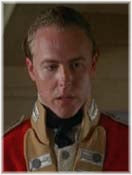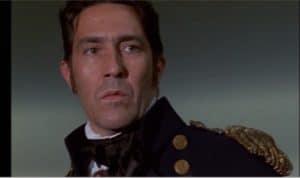Entry into the Officer Corps
All Officers in the British Army began their careers by obtaining their first "Subaltern" commission. Depending upon the regiment, that would be as an Ensign, Second Lieutenant, or Coronet. This article will examine how officers made that first step; promotion to higher ranks will be covered in a separate installment. Men could become officers in the Army in a number of ways. Those in the Ordnance Corps, such as Artillery and Engineers, were trained at Woolwich Academy, but were not considered to be truly "gentlemen"' despite being an Officer (and will not be dealt with in this article). Entry into the Cavalry or Infantry was either by "purchasing" his Commission, or by a number of "non-purchase" options.  In examining this subject, it is necessary to divide the era into two parts, those before and after the Duke of York’s reforms of 1796. Before the reforms, there were fewer regulations to determine how young a prospective officer should be, or how they obtained their rank. The Duke’s reforms created the provision that candidates needed to be at least 16 years of age (although a few younger did slip through, and there was also an upper limit of 21).
In examining this subject, it is necessary to divide the era into two parts, those before and after the Duke of York’s reforms of 1796. Before the reforms, there were fewer regulations to determine how young a prospective officer should be, or how they obtained their rank. The Duke’s reforms created the provision that candidates needed to be at least 16 years of age (although a few younger did slip through, and there was also an upper limit of 21).
They were also to be "gentlemen," able to read and write, be of good character, and vouched for by a superior officer. All applications were to be transmitted through the Colonel (or Officer Commanding the Regiment) to the Commander-in-Chief’s Military Secretary (if at Home) or the General Officer Commanding at the station (if abroad). While to many modern eyes, the "purchase" system seems archaic, and favouring the select few at the top, people in Jane Austen’s time took a very different view. Medieval in its most distant origins, it continued until the Reforms of 1871. Under this system, officers paid a set price for the rank that they held. The intention was to attract the men of fortune and character who would best know how to look after the nation’s interest. As they "owned" their Commission, it was expected they would be more responsible of their "property" (even though legally it was held by the Crown). As the King had not granted them their position, it also made them appear less likely to be used against the "People." 
To purchase a commission, the required sum of money would be deposited with the relevant "Regimental Agent." Commissions could be bought either from the Government, or from officers desirous of selling their Commission and retiring from the service. Agents were empowered by the Commander-in-Chief, or the Officer Commanding a Regiment, to handle public moneys in accordance to regulations. They were also authorized to act as the banker and business manager for the individual officers serving in ‘their’ regiments. They were not directly part of the Army, and need not necessarily have served in the Army (although many had). Some Agents acted on behalf of several Regiments. The Agent in turn submitted the applicant’s name and letters of recommendation to the Adjutant General’s office at Horse Guards, where the C-in-C would approve of it. People other than authorized Agents were prohibited from acting in the sale or purchase of commissions. The Duke’s Reforms also set the prices for each Rank: to be an Ensign in a Regular Regiments of Infantry, £400; in Regiments that had Second Lieutenants, £450; in the Foot Guards: (where Ensigns were the equivalent of Lieutenants in Regular Regiments) £600; to be a Coronet in the Dragoon Guards or Dragoons cost £735, and in the Royal Regiment of Horse Guards, £1050. One can well imagine the extra social status attached to a Commission in the more "elite" units.
The penalty for trying to pay more than the set price, was to immediately forfeit the Commission, and to be cashiered. Aiding and abetting constituted a Misdemeanor. Regulation also prohibited any advertising, or making any other promises, rewards, contracts, etc. This would not, of course, prevent any supposedly unrelated deal between two gentlemen from taking place. (These reforms were not, however, entirely without flaws. In March 1809, the Duke of York was compelled to resign as Commander-in-Chief, when it was discovered that his mistress had been trafficking in the sale of Commissions. He was, however, reinstated in 1811 when his successor, Sir David Dundas, proved to be an inefficient replacement.) 
While to modern readers this would seem to favour those at the top of the society, some people at the time felt it was less open to excessive abuse of patronage. It also opened up entry into the Officer Corps for the sons of the rising "middle class": soldiers, clergymen, professionals, and even tradesmen. While by right of their commission, all officers were "gentlemen." This would give such men an element of "respectability" that they might not immediately hold by virtue of their birth. However, while some of these could afford to buy commissions, the majority applied for non-purchase vacancies. There were a number of "non-purchase" ways of obtaining a commission, including: being a "Gentlemen Volunteer," being promoted from the ranks, as other means. These could occur by the death, disability, retirement, etc., of another officer, creating a vacancy that needed to be filled immediately. Other openings came with the establishment of new Regiments, or the expansion of existing ones. Gentleman Volunteers were young men who applied to the Commanding Officer of a Regiment to serve at their own expense in the hope of filling a non-purchase vacancy when it occurred. They usually carried a musket, but wore a uniform cut in the style of an officer, but with minimal ornamentation. They fought in the ranks, but socialized with the Officers. In other cases an NCO (Sergeant or Corporal) might perform a deed of valour that came to the attention of the military establishment, which felt the individual merited being made an officer. However, the practice was to appoint them to another regiment than the one in which they served in the ranks. 
"Free Vacancies" came in a number of ways. Openings for junior officers might open up in a Regiment, which were filled without purchase, or having previous military service. This was done by applying directly to the Commander-in-Chief, accompanied by the applicant’s testimonials. These vacancies most frequently occurred in colonial formations, or in one of the "Foreign Corps". Edmund Wheatley for example, obtained one such Ensigncy at the age of 21 in the King’s German Legion (which despite an admirable record on the battlefield, was not considered suitable for "gentlemen"). However, in almost all cases the Commanding Officer’s backing was crucial. Openings occasionally occurred as the result of a court-martial ending dismissal from the service. (However, usually if a man was cashiered, his replacement came from outside the regiment, so that it might not appear there were other motives behind his removal.)
Some Officers transferred from the Militia (where rank was related to one’s income based on property, later extended to trade, albeit at a higher rate). However, one could not normally carry over their existing rank, but had to enter as Ensigns. Records show not only if a commission was purchased, but also if he was a volunteer, a former NCO, or a private gentleman. Michael Glover, who examined the Gazette, calculated that in the war 4.5% of new subalterns were Volunteers. He also calculated that another 5.42% were ex-NCOs, exclusive of Ensigns from Veteran Battalions (who were almost entirely drawn from the ranks). Thus nearly one in ten of the officers came from the two mentioned categories. This might be even higher if those who were discharged before taking the commission were added.
Jason Everett has been a re-enactor since 1982 with a group representing a red-coated Canadian regiment of the War of 1812. For the past five years he has been its Commanding Officer. Other interests include Modern Ballroom, and Regency Country Dancing. Military Re-enactment Society of Canada / Incorporated Militia of Upper Canada
SOURCES: Great Britain, Adj-General’s Office, General Regulations and Orders for the Army, 1811. Bryan Fosten, Wellington’s Infantry(I) [Osprey Men-at-Arms series] Stuart Reid, "Officers and Gentlemen: Commanding the British Army," The Age of Napoleon (Nrs. 30 & 32) Edmund Wheatley (Christopher Hibbert, ed.), The Wheatley Dairy.


1 comment
[…] Entry into the Officer Corps Boyle, Laura.(2001) Jane Austen Centre On Line Magazine. […]
An Officer and a Gentleman ~ Random Bits of Fascination
Leave a comment
This site is protected by hCaptcha and the hCaptcha Privacy Policy and Terms of Service apply.